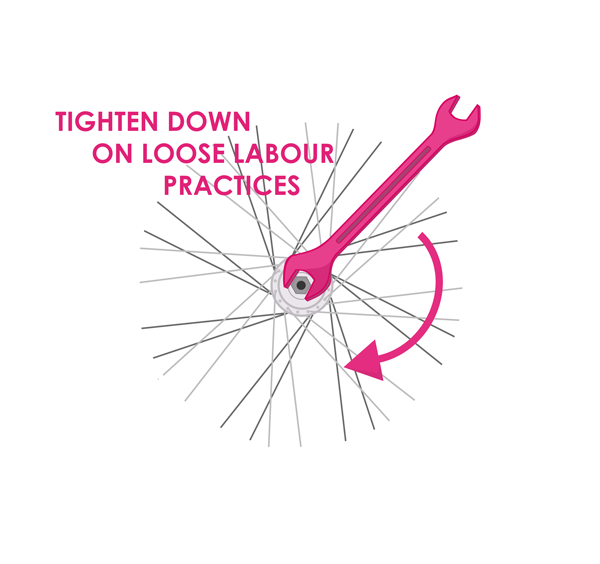



We recognize that we can’t just fight precarious work in one place, it must be challenged everywhere. We have been developing connections with fellow couriers who work for other delivery platforms and in other countries to see how we may collaborate, learn from each other and work together to improve everyone’s lives.
Justice for Foodora Couriers wants fair compensation for dangerous work, the ability to recover when sick or injured, and a respectful workplace free from harassment and intimidation for our fellow food couriers. Foodora uses the independent contractor model to avoid giving their works the health and safety support they so desperately need. Their pay-per-order model means that during slow periods workers receive wages lower than minimum wage. This is after the courier has sunk hundreds or thousands of dollars keeping their bike, car or scooter in good working order. This model allows foodora to reap all the benefits while offloading all the risk onto their couriers. We need the basic rights and protections that employees in other industries can expect. And we deserve a seat at the table when it comes to our jobs and our futures.
Justice for Foodora Couriers is a drive to unionize Foodora couriers to improve conditions. We are challenging the paradigm of precarious work. Companies like foodora strip labour protections from workers under the guise of “innovation,” by calling us “independent contractors.” But we can work together to assert our rights. United, we can win fair pay for our dangerous work, the ability to recover when sick or injured, and a respectful workplace free from harassment and intimidation.
In order to accomplish all this, we are preparing to join the Canadian Union of Postal Workers. Once CUPW is certified as our bargaining agent, Foodora will be legally required to negotiate with us as one group. The current individual contracts that give all the advantage to Foodora.
At the same time we are challenging the new paradigm of precarious work. The increasing precarity of work is a tech-led move toward stripping hard-won labour protections from workers under the guise of innovation. We must to challenge this in our workplaces, in the courts, and on the street. . We have also begun developing relationships internationally with other couriers who work for Foodora and other platforms. Foodora is a multinational company and our pursuit of justice must be a multinational effort. In the big picture, we want to build a campaign that improves working conditions for all delivery workers.
Our work is fast-paced and dangerous. In cars or on bikes, we’re totally vulnerable to Toronto traffic – a chaotic swirl of cars, cyclists, pedestrians and potholes. We try to balance safety and speed to get through enough orders to make ends meet. We’re currently responsible for costs like gas, meals, phones, tickets, and vehicle repairs, which really add up.
For those of us on a bike, there is constant fear that a door might open or a careless driver might cause an accident, leaving a courier unable to earn a living. Those of us in cars are dealing with other drivers, construction, potholes and the elements too. We’re expected to respond to texts while we’re on the road, and finish orders no matter what the conditions or events.
Foodora touts the flexibility of the schedule but that same “flexibility” also means no stability in shifts from week to week. Many couriers who worked through the whole winter cannot find enough shifts come spring. Access to shifts is withheld or portioned out by foodora based on previous performance; this means that lower earners may be unable to support themselves working for Foodora and have to juggle multiple delivery apps to make a living.
Working outdoors may sound nice in fine weather, but our work is busiest in the bad conditions, when most people don’t want to be out. We have no paid sick days and so we have to work sick or injured to make rent. We’re denied basic rights and protections that all workers deserve, because Foodora considers us independent contractors. Without the protection of a union, foodster live on the edge of financial instability and serious injury.

Not long ago, restaurants that offered a delivery service hired their own drivers and staffed to their own needs. Those drivers’ working conditions were not ideal, they were mostly on their own to work out a way to make a living in relative health, safety and stability.
Disruptors like foodora and Uber came along to group delivery services into one very big market. They capture a share of it, and maximize their own profit while minimizing their responsibilities. Hungry customers choose it out of convenience; restaurants feel pressure to participate and pay the fees, or be excluded; and couriers work for the app company on a fee-per-order basis. So now, huge numbers of couriers deliver food for the same boss - the app/platform. That’s a new opportunity to unite these workers and improve their working lives.
What companies like Foodora present to hungry customers is a frictionless experience, an apparent triumph of super-efficient technology. To the end user, it appears faster, cheaper, neater, even greener — you always see the bike couriers in their ads, never the cars.
But the transformation is profound: where there used to be relationships between the restaurants, the courier, and the diner, now each party interacts mainly with the app. It may mean that each party’s issues are invisible to the others. It definitely seems to make the restaurants and the diners less aware of whether the couriers’ working conditions are survivable and sustainable.
Foodora and the others present it as cutting out the inefficiencies of the old model, but they put the cost of this rapid change onto anyone but themselves. In other words, what it takes to create the illusion is greater pressure on workers and the creation of precarious employment instead of jobs in the traditional sense.
Foodora operates in about six cities in Canada. Restaurants pay them up to 30% of the order total, while they give the courier just a few dollars to deliver it. Foodora denies the drivers employee status, so they’re not eligible for EI and other statutory benefits. And when it comes to safety on the road, they’re basically out there on their own. These are not the sort of jobs that support our economy. In the bad weather, in traffic, working for a few dollars per kilometre, foodsters (the inside term for Foodora couriers) are among the most vulnerable workers in the industry.
If these food delivery apps are here to stay, we have to figure out how to make it safe and sustainable to work in that system.
If you’re someone who eats, then you should support better conditions for the people who deliver our food orders.
One of the main selling features of precarious work is flexibility. This is presented to the workers as freedom, but it comes with unpredictable working hours and wages. This uncertainty is a major mental stressor on the workers, and can have corrosive effects on our personal and family lives.
Some workers find the flexibility appealing, especially students, artists and some parents. They may be afraid to challenge the company to improve: for fear it will take away their flexibility.
We see couriers as dependent contractors. On this basis, we can demand improvements in working conditions without giving up all the flexibility.
We do not accept that flexibility should come at the expense of safety, benefits, and stability. We believe that flexibility and fairness can go together. And we do not believe flexibility justifies the company dodging its responsibilities.
In precarious work, the workers takes on a larger — and unfair — portion of the risk.
In traditional employment, when business is slow, the cost incurred is borne by the owner, or it is shared between the employees and the owner. In a precarious job like that of a food courier, the cost of low demand is borne by the worker. In the pay model of piece-work, in which there is no guaranteed income at all.
On the upside, when things are very busy, wages can be good. But when there isn’t enough work to go around, wages sometimes fall below minimum wage.
In most regular employment, employers pay the cost of training.
To lower costs and raise profits, companies creating precarious work outsource their training to universities and the government or job agencies. In the case of food delivery companies, Foodora and Uber offload the cost of training directly onto the workers. Riding, vehicle maintenance, navigation, traffic laws––there is an acquired knowledge required for the job for which foodora takes no responsibility.
Couriers do not get better pay for good performance. In theory tips reward good service, but in practice tips are arbitrary and unreliable. The only performance measurement that is rewarded is called the courier’s Utilization Rate (UTR), based on deliveries per hour. The Foodora algorithm sequences deliveries in such a way that a higher delivery rate can be difficult. In some cases a delivery rate that pays a living wage can only be reached through dangerous driving.
Precarious workers commonly have no benefits like dental insurance, physiotherapy, a retirement pension or disability insurance.
Foodora pays into the Workers Insurance Board of Canada (WSIB), but workers receive no other benefits. Many bicycle couriers need ongoing physiotherapy just to keep performing their job for the long term. And injuries are frequent.
Without benefits, independent contractors have to charge higher rates to cover their own costs. But we don’t have that option: we are really dependent contractors. Our only independence is a fiction maintained by food courier companies like Foodora to avoid employment responsibilities.
In traditional companies, workers can form strong sense of shared identity or pride in the company and each other. Forming a community makes work stress more bearable and establishes a support network when workers are hurt or struggling.
Precarious workers are discouraged from forming strong bonds with the company or their co-workers. This makes it easier for the company to downsize or upsize when needed to suit consumer demand.
But it atomizes and isolates workers. Couriers have created community in spite of all this, but this is limited, informal, and not totally inclusive. People fall through the cracks.
Food couriers do not really have a place to rest and socialize. Foodora does not provide a warm-up space or a rest area, let alone washrooms. Couriers have had to meet in coffee shops, bars, parks, and churches. Workers have also created digital spaces where they can socialize.
These are no substitute for an actual heated space with couches and garage space where workers can rest and socialize — especially in the harsh Toronto winters. The experience can be lonely, especially when one is new to the job.
The Foodora app puts couriers in some bizarre situations.
Deliveries are coordinated by an algorithm that accounts for distance and time, but not the resources required to travel these distances. As such it will make silly demands on the couriers, assigning a sequence of deliveries to the courier that requires them to backtrack unnecessarily; that requires them to drive across the entire city for a delivery that’s only a couple hundred metres long; and assigns couriers to orders that won’t be ready for while, instead of allowing for another order in the meantime.
Some neighbourhoods have a density appropriate for cyclists, some for cars. Some topographies are better for cars than bikes. Construction changes the whole situation. Weather is not accounted for. This leads the algorithm to assign bicycle couriers dangerous deliveries, at the same rate as a normal delivery.
If a courier refuses such a request, there’s no pay, and they’re penalized by the algorithm for assignment of future orders. This irrationality that’s baked into the algorithm doesn’t hurt the company much: only the courier.